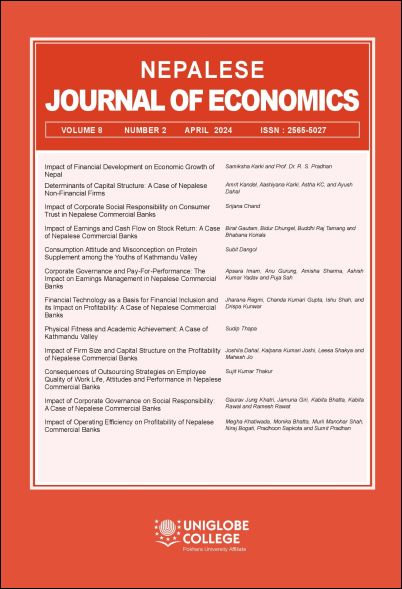Corporate Governance and Pay-For-Performance: The Impact on Earnings Management in Nepalese Commercial Banks
DOI:
https://doi.org/10.3126/nje.v8i2.68806Keywords:
board size, tenure of CEO, age of CEO, bank size, board meetings, compensation, independent director, foreign ownership, efficiency ratio, basic earning powerAbstract
This study examines the impact of corporate governance and pay for performance on earnings management in Nepalese commercial banks. Efficiency ratio and basic earning power are selected as the dependent variables. The selected independent variables are board size, tenure of CEO, age of CEO, size of firm, board meetings, compensation, independent directors and foreign ownership. The study is based on secondary data of 17 commercial banks with 102 observations for the study period from 2017/18 to 2022/23. The data were collected from Banking and Financial statistics published by Nepal Rastra bank and the annual reports of the selected commercial banks. The correlation coefficients and regression models are estimated to test the significance and importance of corporate governance and pay for performance on earnings management in Nepalese commercial banks.
The study showed that board size has a negative impact on efficiency ratio and basic earning power. It indicates that increase in board size leads to decrease in efficiency ratio and basic earning power. Similarly, tenure of CEO has a negative impact on efficiency ratio and basic earning power. It indicates that increase in tenure of CEO leads to decrease in efficiency ratio and basic earning power. Likewise, age of CEO has a positive impact on efficiency ratio and basic earning power. It indicates that higher age of the CEO in the organization leads to increase in efficiency ratio and basic earning power. Further, size of firm has a positive impact on efficiency ratio and basic earning power. It indicates that larger the size of firm, higher would be the efficiency ratio and basic earning power. In addition, board meetings has a positive impact on efficiency ratio and basic earning power. It indicates that higher the number of board meetings, higher would be the efficiency ratio and basic earning power. Moreover, compensation has a positive impact on efficiency ratio and basic earning power. It indicates that better the compensation facilities, higher would be the efficiency ratio and basic earning power. Likewise, independent directors has a positive impact on efficiency ratio and basic earning power. It indicates that increase in independent directors in the board leads to increase in efficiency ratio and basic earning power. Further, foreign ownership has a positive impact on efficiency ratio and basic earning power. It indicates that higher the proportion of foreign ownership, higher would be efficiency ratio and basic earning power.




